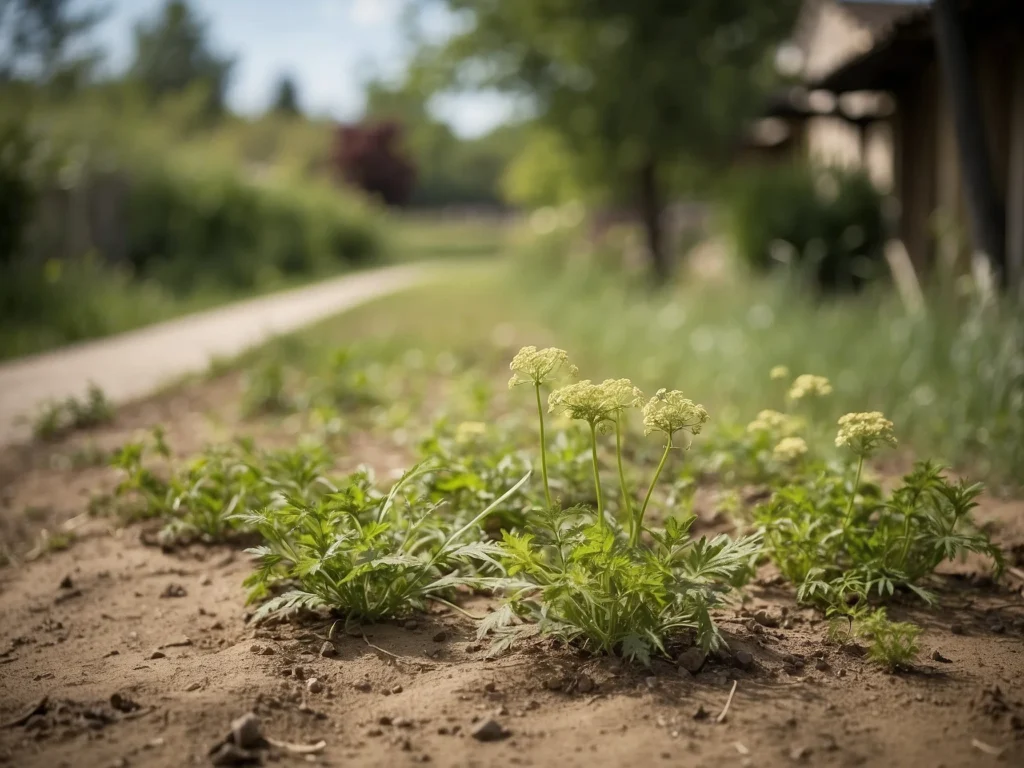Weeds are the bane of many gardeners’ existence. These unwanted plants pop up in flower beds, vegetable gardens, and even cracks in driveways and sidewalks. While chemical herbicides effectively kill weeds, many prefer organic weed control solutions. This is where vinegar can come in handy. Vinegar is an natural and organic substance that can be an effective weed killer when used properly.

This article’ll explore using vinegar as a DIY weed control method. We’ll cover topics like:
- What natural substances like vinegar can kill weeds
- How to mix and dilute vinegar for maximum weed-killing power
- The different types of vinegars and their effectiveness on weeds
- Whether vinegar hurts grass and other plants you want to keep
- How long it takes for vinegar to work on weeds
- Vinegar alternatives like bleach for tough weeds
- Using vinegar on specific weeds like in cracks and driveways
- Selectively killing weeds without harming nearby plants
- The effects of directly spraying vinegar onto weeds and pests like ants
By the end of this guide, you’ll better understand how to harness the weed-killing power of vinegar in your garden. Let’s dive in and explore vinegar as an organic, natural weed control solution.
What Natural Substances Kill Weeds?
Before focusing specifically on vinegar, let’s look at some other household substances that can be used as natural weed killers:
- Salt: When applied directly, table salt or rock salt can effectively dehydrate and kill weeds. However, salt can also damage soil structure long-term.
- Lemon juice: The high acidity of lemon juice is comparable to vinegar for killing weeds. It works best on hot, sunny days.
- Baking soda: Baking soda alters soil pH to create an environment unfavorable to weeds. It may take some time to work.
- Soap: Soap-based weed killers penetrate leaves and essentially suffocate the plants. Dish soap or castile soap work best.
Out of these options, vinegar is generally the most effective and commonly used homemade weed killer. The main reason is that the acetic acid in vinegar is strong enough to kill weeds at a useful dilution, without severely impacting soil. Let’s look at how to mix vinegar for weed control next.
How to Dilute and Mix Vinegar for Weed Killing
Using vinegar at full strength (5% acidity) is often unnecessary and risky for plant health. Instead, you’ll want to dilute regular 5% vinegar with water for an optimal balance of effectiveness and safety:
- Mixing 1 part vinegar to 3 parts water is ideal for general weed control.
- Increase vinegar concentration for tougher weeds. A 1:1 ratio of vinegar and water provides stronger effects.
- Add a teaspoon of dish soap to help the vinegar stick to weed leaves better.
- You can also combine vinegar with salt, lemon juice or baking soda for added impact.
When mixing your diluted vinegar weed killer, be sure to use safety precautions:
- Wear gloves, long sleeves, pants and eye protection. Vinegar can irritate skin and eyes.
- Only mix outside or in a well-ventilated area. Do not breathe in concentrated vinegar fumes.
- Label your vinegar herbicide clearly and store safely out of reach of children and pets.
Vinegar can be mixed into a powerful organic weed control solution with the right dilution and safety measures.
Types of Vinegar for Killing Weeds (Including Raw and Horticultural)
For maximum weed-killing power, the type of vinegar you use matters:
- White vinegar (5% acidity): The most readily available option, effective on young, tender weeds.
- Apple cider vinegar (5% acidity): Slightly more expensive but useful for resistant weeds.
- Raw, unfiltered vinegar (up to 20%): This strong vinegar works fast but may damage soil over time.
- [Horticultural vinegar (20% acidity):] Specifically formulated for plants, provides strong weed control effects.
While regular 5% white vinegar works for most weed situations, horticultural vinegar is worth the investment for severe infestations. It provides a very high concentration of acetic acid but won’t linger in soil as long as raw vinegar.
Look for horticultural vinegar sold as an herbicide or at gardening stores. Use protective equipment when applying, as it can irritate. Test on a small area first before widespread use.
Does Vinegar Kill Grass and Other Plants?
A common concern with any weed killer is avoiding damage to grass, flowers, vegetables and other desirable plants. When used properly, vinegar can kill weeds selectively without harming nearby plants.
Here are some tips for keeping vinegar weed control targeted:
- Spot treat weeds rather than widespread spraying to avoid contact with grass and plant leaves.
- Use a small brush or spray bottle to coat weed leaves instead of surrounding areas directly.
- Choose less acidic dilutions like 1:3 vinegar to water. Stronger mixes have higher risks.
- Avoid spraying on hot, sunny days when plant leaves are most vulnerable.
- Rinse off any accidental overspray on plants with plain water immediately.
With careful, selective application, vinegar can kill weeds efficiently without damaging nearby plants you want to keep. Monitor your garden plants after treatment for any signs of stress or damage.
How Long Does Vinegar Take to Kill Weeds?
Vinegar does not work instantly on weeds; patience is required. Here is a general timeline of what to expect:
- Young annual weeds may show effects within 24 hours as leaves shrivel and plants droop.
- Mature annual weeds and young perennials may take 2-4 days to yellow, wilt, and fully die.
- Established perennial weeds and woody plants like poison ivy may take 1-2 weeks for vinegar to fully translocate down to the roots.
- Prevent regrowth by spraying any new shoots as needed. Foliar damage is temporary, but root death is essential.
The speed of vinegar weed control depends on the plant’s age, type, growth density and environmental factors. Allow time for the acetic acid in vinegar to work before reapplying.
Can Other Substances Be Used Like Vinegar?
For very hardy weeds, alternatives to vinegar may provide stronger effects:
- Bleach (sodium hypochlorite): Diluted bleach provides high potency against tough weeds, but can cause environmental damage. Use sparingly and avoid skin contact.
- Boiling water: Pouring 212°F water on weeds directly can provide heat shock for quick damage. Take extreme care to avoid scalds.
- Flame weeding: Using a small propane torch on weeds kills growth above and below ground. However, fire hazards exist.
While bleach and other caustic chemicals can kill weeds, they carry substantial safety and environmental risks if used improperly. Vinegar is often still the best home remedy for organic weed control.
Special Cases: Weeds in Cracks, Crevices, and Yards
Spot treating weeds with vinegar becomes especially useful in tight spaces that are difficult to weed manually:
- Cracks in driveways or sidewalks: Use a spray bottle to directly coat weeds sprouting in cracks.
- Along garden paths: Target weeds growing in path joints without harming nearby plants.
- Yards and lawns: Mix vinegar with dish soap and selectively spray weeds overtaking grass with a small pump sprayer.
The main goal is delivering enough vinegar solution right onto unwanted weed leaves while limiting overspray. For driveway and patio cracks, use a long narrow nozzle to hit weeds while shielding building surfaces.
Selective Weed Killing with Vinegar
A key benefit of using vinegar for weed control is the ability to target specific weeds without widespread damage:
- Use a small paintbrush, cotton swab or spray bottle to coat weed leaves while shielding surrounding plants precisely.
- Try using a cardboard shield or plastic sheet with a hole to isolate one weed at a time.
- Spray early in the morning or late evening when vine leaves are folded vertically versus flat during mid-day.
- Immediately rinse any Solution contact with desirable plants with plain water to prevent damage.
With practice and observation, you can become skilled at selectively eliminating weeds with vinegar even in tightly crowded gardens.
Effects of Spraying Vinegar Directly on Weeds and Pests
While most vinegar weed control focuses on spraying plant leaves, you can also use full-strength vinegar for:
- Weed roots: Pouring vinegar directly onto roots can provide rapid burndown. Useful for driveway cracks or patios.
- Invasive vines: Spraying vines and stems of tough weeds like poison ivy can provide systemic control.
- Ant mounds: Pouring vinegar into anthills can help eliminate ants by lowering the pH of their nest.
- Weed growth Prevention: Lightly spraying soil with diluted vinegar before planting can temporarily lower soil pH to prevent weed seeds from sprouting.
When spraying full-strength vinegar, protect yourself with gloves and eye protection. Avoid breathing in fumes directly.
While direct vinegar application provides added weed and pest control, it does carry higher risks like soil damage over time. Use sparingly only when needed for tough situations.
Conclusion
Vinegar can be an effective organic weed control option when used properly. Follow these tips to harness the power of vinegar against garden weeds:
- Dilute regular 5% vinegar with 3 parts water for an optimal balance of strength and safety.
- Use selective application techniques like targeted spraying to only damage weeds, not surrounding plants.
- Give vinegar time to work, especially on mature and perennial weeds. Be patient and reapply as needed.
- Consider horticultural vinegar for severe infestations, but use protective gear when applying.
- Combine vinegar with dish soap, salt, or lemon juice to increase effectiveness on hardy weeds.
- Focus vinegar on weed leaves rather than widespread soil treatment to avoid environmental impacts over time.
While not a overnight cure-all, vinegar is an accessible, natural herbicide that can be part of an integrated weed management plan. Along with manual removal, mulching and other techniques, vinegar can help you gain upper hand against invasive weeds organically.
